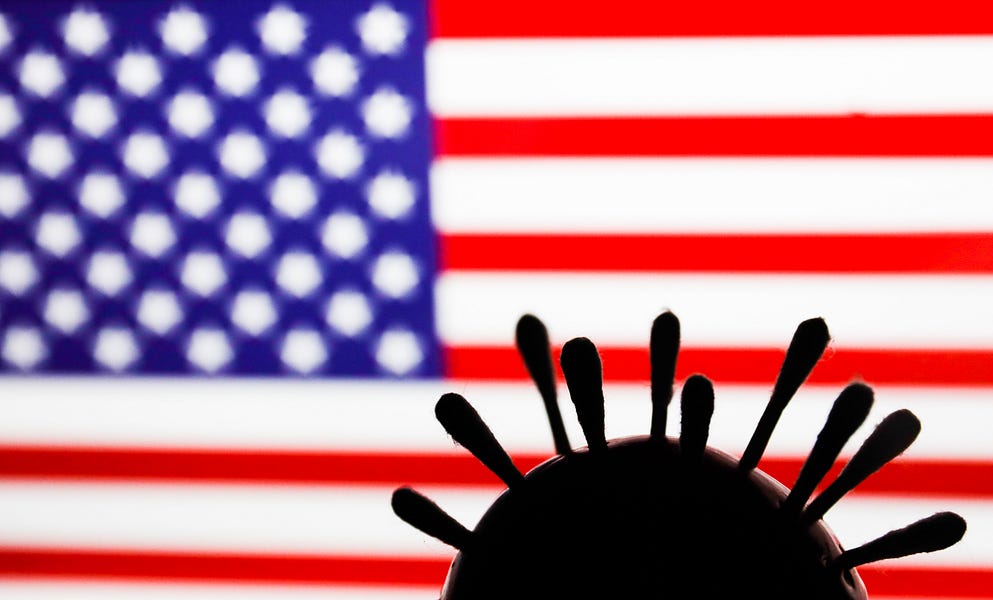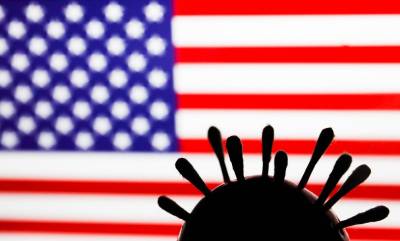As a nation, we faced a brutal enemy together this year—one that started on the other side of the world and infected us on our own soil. One that left unprecedented economic damage in its wake. One that still continues to roil our country. One that bludgeoned my own family this year.
My wife Apoorva and I had our first baby, a son, in late February, right before the peak of the pandemic. She’s a doctor, and she skipped a normal maternity leave to treat patients at the hospital during the pandemic. She helped a lot of people, but she was ultimately infected. This meant she would have to be separated from our baby son for more than two months this spring. It crushed her to see our infant son on video chats, and not to be able to hold him in her arms. That’s real hardship—just like the hardships endured by thousands of healthcare workers and millions of hard-working Americans this year.
Seven months into a tough year, and with COVID-19 cases and deaths climbing again, it’s a good test to answer who we are as Americans. Are we survivors? Or are we victims?
The fundamental mistake made by some members of the political left is to think of hardship as “victimhood."It’s not. Hardship is what reminds us of who we are. Victimhood is the choice that prevents us from overcoming it. Going through hardship and emerging stronger from it is the essence of what it means to be an American.
Just like 9/11, the pandemic is a national tragedy. And like 9/11, it affected us whether we were male or female, black or white, gay or straight, Democrat or Republican. It reminded us that our greatest threats are not the “microaggressions” that one group commits against another, but the macroaggressions that we face together as one people. It reminds us that our greatest vulnerabilities are shared equally: Even the disparities in death rates along socioeconomic lines are simply reminders of antecedent inequities, rather than something specific to the virus itself.
The virus reminds us that the cure to our greatest ills, including racism, is not being more woke to our differences, but more awake to our commonalities. It reminds us that our diversity is beautiful, but is meaningless without something greater that binds us together as a people. COVID-19 has the potential to mark the end of a decade of celebrating our differences, and the start of a new decade of celebrating our shared identity as Americans—an identity based not on shared genetics, but on shared values.
The most important of those values is that as Americans we choose democracy over tyranny. In any moment of national crisis, we face a temptation to surrender to the siren song of authoritarianism. During the depths of the Great Depression, many Americans praised the supposed efficiency of Nazi Germany with its new autobahns and full employment. During the early days of the Cold War when the USSR’s Sputnik program beat us into outer space, many preached the historical inevitability of Soviet collectivism. In the current COVID-19 crisis, we hear whispers that America can only succeed by being “more like China.”
Nothing could be further from the truth. Recall that the viral outbreak spread fastest in its early days because of China’s decision to silence its own people. Studies estimate that the total number of coronavirus cases globally could have been reduced by 95 percent if the original local outbreak had been recognized and addressed more quickly in Wuhan. Unfortunately, this was directly impeded by the Communist Party of China, which tried to conceal the existence of the virus and reprimanded physicians who alerted colleagues, ordering them to cease testing and destroy samples.
Even after internet videos leaked and it became impossible for China to keep the outbreak a secret, China still denied the existence of human-to-human transmission as late as January and withheld viral genetic sequences from the global community beyond internationally mandated timelines, delaying the development of vaccines and therapeutics. Brave Chinese citizens who criticized their government for its mistakes have been jailed, silenced, or “disappeared.”
While we often ignore the behavior of autocratic rulers when our own lives are unaffected, in this case the consequences are too real: an injustice somewhere became a pandemic everywhere.
Most importantly, we learned the same lesson during the first SARS epidemic of the 21st century. As noted in The Pandemic Century (written by medical historian Mark Honigsbaum and published last year prior to COVID-19), the 2002-03 SARS epidemic only came to global attention when it reached Hong Kong because of suppression of information by Communist authorities in mainland China. It was only after several high-profile deaths in Hong Kong that outspoken scientists there uncovered the existence of the SARS virus and reported it to the World Health Organization in March 2003. It was not until April 2003, when a Chinese whistleblower revealed the true numbers of SARS infections in Beijing, that Communist authorities owned up to the full extent of the outbreak and mobilized resources to quell it. SARS ended up infecting thousands of people from 29 countries before it was stopped. We learned the same lesson on a much larger scale with COVID-19. Let us vow to never again learn that lesson a third time.
For those reasons, it is not inherently wrong or even unbecoming to call COVID-19 the “Wuhan virus” or the “Chinese coronavirus.” The fact that this nomenclature became a controversy at all reflects China’s growing cultural influence over global norms, exploiting Americans’s insecurity on any question even tangentially implicating race in 2020. For example, MERS, an older coronavirus, stands for “Middle Eastern Respiratory Syndrome.” Ebola is the name of a river in the Congo where it originated. The Zika virus was named after the forest in Uganda where it originated. Marburg virus is named after a town in Germany. The list goes on.
More importantly, doing so in the case of COVID-19 further reminds us that the spread of the global pandemic was enabled by the modern Chinese state. If the virus had originated in a democratic nation, it is at least plausible to believe that a local epidemic could have been contained rather than become a global pandemic—owing to a free press, a culture of open dialogue, and most importantly the demonstrated freedom of our citizens to openly criticize our own government, the best way to hold any government accountable to its people.
Importantly, this is not a critique of the Chinese people, but of China’s Communist Party. Here in the U.S., we must resist any impulse to view Chinese people through any different lens because of this pandemic. Chinese immigrants to the U.S. voted with their feet for democracy over autocracy. Many of them are heroes for doing so. Our ability to recognize this is part of what defines us as Americans.
We should, of course, engage with China as constructively as possible on the global stage but seeking to emulate China would be more toxic to America than even COVID-19. Though China’s failure to be transparent early on contributed to infecting the rest of the world, China is already boasting of its ability to contain the virus through draconian measures possible only in an autocratic state. America still has an opportunity to show that we can handle this virus while still respecting liberal democratic values. Our system of government gives us the chance to build greater public trust with our citizenry, in such a way that our citizens can follow public health guidance not out of fear of imprisonment, but through knowledge—which we can access and question freely through an uncensored internet. That freedom allows us to accept certain sacrifices, while never tolerating forcible house arrest without due process. We will never countenance the removal of law-abiding citizens from their homes to be tested at overcrowded facilities where uninfected individuals are essentially forced to contract COVID-19, influenza, or both—as we saw in China.
Of course we haven’t handled COVID-19 perfectly, or even particularly well, so far. We need to rapidly increase our supply of ICU beds in regions that are hardest hit. Conservatives and liberals alike should embrace the act of wearing masks and heightened sanitization procedures not as hallmarks of fear or inconvenience, but as acts of personal responsibility. We should develop therapeutics to treat COVID-19 patients—especially the most severely impacted patients who require hospitalization. We should simultaneously implement widespread testing and use anonymized patient data to track the spread of the disease and communicate geographic hotspots to the public. None of this requires Chinese autocracy. To the contrary, it requires an engaged citizenry holding its leaders—and itself—accountable for results.
America isn’t perfect. We never have been. But America is the pursuit of perfection. The pursuit of a more perfect union. The pursuit of happiness. The pursuit of liberty, equality, and justice for all.
These are the values that won the American Revolution. These are the values that reunited us after the Civil War. These are the values that won us World War II, and the Cold War, and the war on terrorism. These are the values that still give hope to the free world. If we embrace these common values, nobody in the world—not a nation, not a virus, not anyone—can defeat us. That is what true American exceptionalism is all about.
Vivek Ramaswamy is an entrepreneur and writer in the biotechnology sector. He serves on Ohio's coronavirus task force and on the board of the Foundation for Research on Equal Opportunity. His book on woke capital is forthcoming next year. Follow him on Twitter @VivekGRamaswamy.
Photo illustration by Jakub Porzycki/NurPhoto/Getty Images.






Please note that we at The Dispatch hold ourselves, our work, and our commenters to a higher standard than other places on the internet. We welcome comments that foster genuine debate or discussion—including comments critical of us or our work—but responses that include ad hominem attacks on fellow Dispatch members or are intended to stoke fear and anger may be moderated.
With your membership, you only have the ability to comment on The Morning Dispatch articles. Consider upgrading to join the conversation everywhere.